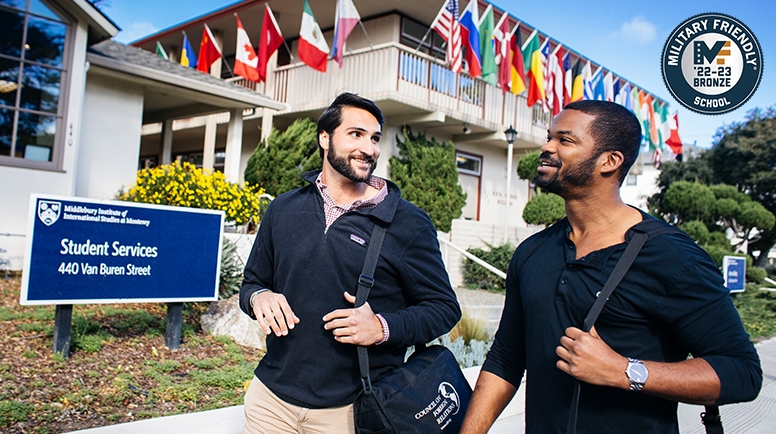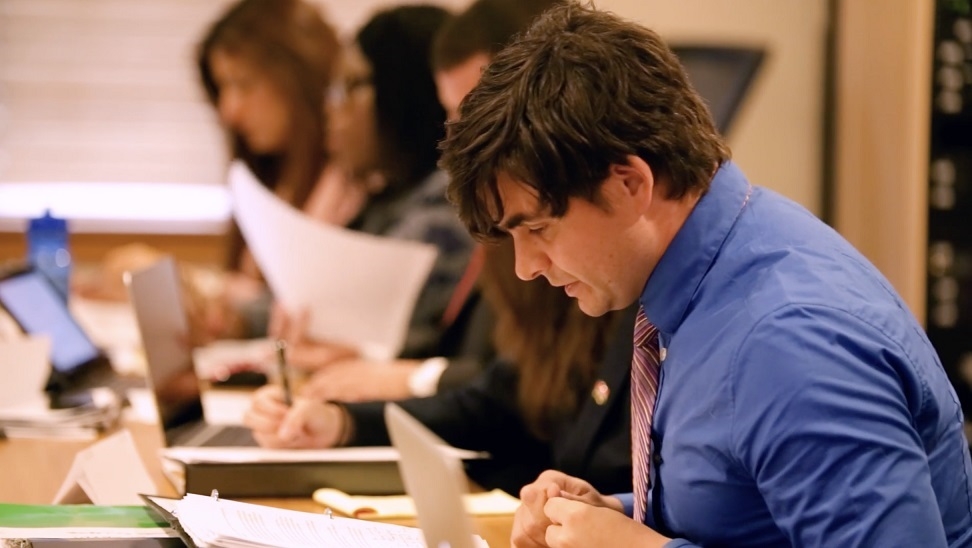Military Friendly: MA in Nonproliferation and Terrorism Studies

Advance your career in global security. Our participation in the Yellow Ribbon Program and other military benefits makes your degree an affordable investment. Study online or in person.
Our Master of Arts in Nonproliferation and Terrorism Studies (NPTS) gives you specialized knowledge and skills that will distinguish you from other graduates. Learn advanced strategies to stop the spread of weapons of mass destruction (WMD), counter terrorist threats, and prevent financial crimes.
Complete Your Degree in 4 Semesters
|
Start Term |
Credits |
Duration |
In Person |
|---|---|---|---|
| Fall or spring | 60 | 4 semesters | Monterey, California |
Download the program guide below to get more details on the curriculum, tuition, military benefits, and career outcomes. You will also be connected with a personalized enrollment advisor.
Download the NPTS Program Guide
Use Your Military Benefits
We offer full tuition coverage for qualifying veterans and their eligible dependents through the Post-9/11 GI Bill® and the Yellow Ribbon Program. We also offer preferential scholarship consideration to those who are not eligible for these benefits. We are committed to making your education affordable and helping you take this next important step in your career.
Learn more about military benefits.
Advance Your Career
Your career and academic advisor has significant experience helping veterans land their dream jobs. You’ll be prepared to work at international organizations; government agencies, including the intelligence community (IC), think tanks, and NGOs; and a range of private-sector employers, including those in the nearby Silicon Valley tech industry.
One Year After Graduation
Employers
Our alumni are working as analysts, associates, and program managers, in leading organizations including the following:
- Apple
- CIA
- Deloitte
- JPMorganChase
- Thomson Reuters Special Services
Working Toward a World of Change
[Jeff Knopf, Program Chair:] The subjects that we focus on in Nonproliferation and Terrorism Studies keep us interested. They’re important problems with big real-world implications. We want to make sure that there’s never a nuclear war, that new states don’t get chemical or biological weapons, that we find effective strategies for fighting back against terrorism.
[Professor speaking in class:] Conflicts and strife within the Muslim community, the Middle East communities from the very beginning. And then of course when Mohammed died, it was more conflicts over the succession.
[Jeff Knopf:] And all I have to do is read newspaper headlines in the morning when I get up and I know I have an important job and an important mission to help educate our students to work professionally in these fields.
[Student speaking in class:] We’ve really sort of been left on our own to defend ourselves. And do you think, is this the moment Jacob to be open about the fact that we have a nuclear weapon?
[Professor speaking in class:] The IDF is not the custodian of nuclear materials.
[Sarah Bidgood, student:] I’ve been able to take my Russian language skills that I came to the program with, and really build them so that I can use them in a professional setting. So now I feel like I can actually talk about real-life problems, talk about arms control issues in this very specific context here at the Institute.
[Student speaking in class:] We call all seats in the region to declare the Middle East to be a region free of nuclear testing even for those states who have not signed or ratified.
[Francisco Pareda, student:] The NPT simulation is a class where you simulate the negotiation of the nonproliferation treaty. It’s a really interesting class, you learn a lot about your country. It’s a lot of work, but the fun part is that you are interacting all the time. You’re representing a different state and representing different interests that you may or may not align with.
[Farah Al-Mousrawi, student:] It made me confident that I was able to accomplish such projects. And that I can go into the workforce loaded with the knowledge that I needed.
[Sarah Bidgood:] For me that felt like a class where I was able to take everything I’ve learned in my introductory courses that far and apply them to real-life problems. And after I completed that course, I had the chance to then go and serve as an intern at the UN Office for Disarmament Affairs in New York, where we were working on that exact treaty. So I took the skills that I learned in that seminar and applied them directly to supporting the secretariat in that endeavor.
[Jeff Knopf:] Every time I take a trip to Washington, DC, I bump into one of our alums who’s working in DC at the State Department, the Treasury Department, the Defense Department, for Congress, I mean, really have students working just all throughout the U.S. government.
[Sarah Bidgood:] The greatest thing about the Middlebury Institute is that it combines not only excellent academics but also professional opportunities.
[Jeff Knopf:] What we do is pretty unique. We have a very specialized niche. And if what we’re doing is what interests you and it’s what can help you get launched on the kind of career you want. Then I think it’s very hard to do better than to come here.
Curriculum
Build your expertise in these areas:
- Policy tools for combating terrorism
- Scientific principles and technologies behind WMD
- Arms control and nonproliferation negotiations
- Open source intelligence (OSINT)
- Cybersecurity
- Financial investigation and compliance
- Area studies and a second language
What Our Alumni Have to Say
Active duty military, veterans, and their dependents make up more than 5 percent of our students, so there’s a strong sense of community here.

Mark Leon-Guerrero
Current Employment: Compliance Operations Investigator, Meta (Chicago, Illinois)
Institute Advantage: Language studies helped me tremendously, as I ended up working for a Japanese company initially. My career advisors at the Middlebury Institute helped me with salary negotiation, searching through the alumni database for potential contacts, and so on. The Financial Crime Management specialization also helped me hit the ground running in my new field.

